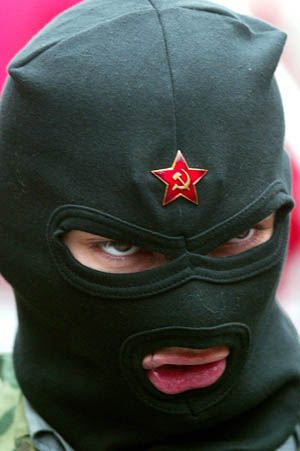Neo-Nazi threat behind a national democracy front?
Memorial services for Anastasia Baburova and Stanislav Markelov are celebrated in Sevastopol, Moscow, and Berlin
Today Moscow is holding a march and a rally in memory of Stanislav Markelov and Anastasia Baburova. Novaya gazeta says the Moscow mayor has approved both events, while St. Petersburg has banned a similar anti-Nazi project. In Moscow, the rally will start at 19:01, at the head of Nikitsky Boulevard, precisely when the tragedy took place in 2009, when the Moscow City Court sentenced Nikita Tikhonov and Yevgenia Khasis to life and 18 years, respectively.
Marina, of the January 19 Committee that organizes the rally in Moscow, told The Day that it is necessary to pay homage to Anastasia Baburova, Stanislav Markelov, and other victims of ideological and political terror: “Otherwise we won’t be able to solve the problems of xenophobia and political reprisal on ethnic and religious grounds. That’s why we’re organizing this rally on January 19, for the third time.
We hope that these anti-Nazi events will help find peaceful settlements to social conflicts, ease social tensions, and maybe change some individuals’ minds. People realize that something has to be done about this xenophobia and ideological enmity, considering that these problems aren’t lessening.”
“Events commemorating Anastasia Baburova and Stanislav Markelov will take place in Russia, in Sevastopol, Anastasia’s home town in Ukraine (more on this in Larysa Baburova’s interview), and Berlin where the documentary Love me, please about Anastasia Baburova, directed by Valerii Balaian, will be screened (more on this in an interview with Balaian).
Anastasia Baburova’s life story is meaningful when viewed at various angles, from the standpoints of Russia and Ukraine. She was buried in Sevastopol, so we Ukrainians must be aware of the reasons behind the death of this young talented journalist, the more so that her story reveals a number of rough edges. She was born to a Russian-speaking family in the Crimea. Eventually she went to Moscow, seeking a better-paid job, destined to meet her end there… While in Moscow, she started writing letters to her parents in Ukrainian. She wanted to study in Europe because she had discovered that the European standards were close and understandable to her.
Russia’s media are smarter than their Ukrainian counterparts in handling commemorative events relating to old and recent history. An important point, considering that such events are another way to warn the existing society about another clear and present danger. Russia is actively discussing the possibility of becoming a nation state. Is this a front for neo-Nazism?






